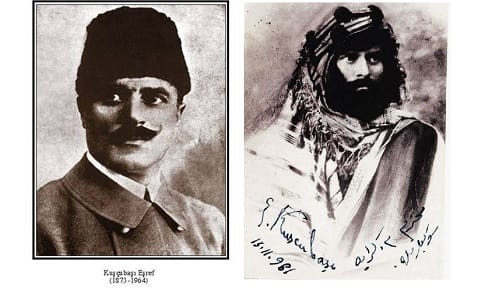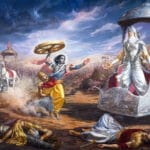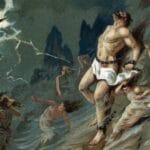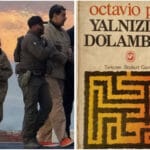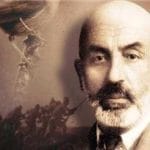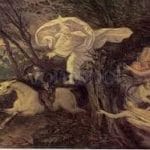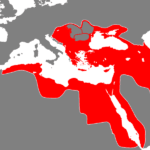“Kuşçubaşı Eşref and Teşkilat-ı Mahsusa (the Special Organization)”*
“…no gunfire/
it’s the clangour of pigeon/that glosses at dawn/
water in the shadirvan/ the call to prayer in the linden trees
a majestic humming of prayer
alas!/who remains from the Holy Hamzabey Mosque
who remains from old Thessaloniki
the hurdy-gurdies are silent/the decanters are left alone
not a single match is strike
who remains, from the Committee of Union and Progress
those Young Turks—
‘they used to import subversive documents from abroad’—
those fedayees who coughed up gunpowder
their beard-shaves are blue/their red mustaches are chilis
who remains, from the Society for the Defense of Rights
in their hunter jackets/astragan hats
sometimes “unionists”/mildly “socialist”
with bushy, angry eyebrows
their brown mustaches are sad/they really smoke badly and the death sentences in their pockets/willow-leaf knives at their waists
either a deputy in the national assembly/or a soldier in the mobile forces…”
Attilâ İlhan
Dear Kuşçubaşı Eşref Bey,
If I’m not mistaken, it was Marcel Proust who said: “What brings people closer is not shared ideas, but kinship of understanding.”
“Understandings”… One’s personality and inner world, stance in life, attitude toward things and events, state and condition… Certainly deeper, stronger than ideas. With shared ideas, you become comrades; with kinship of understanding, you become cronies.
Eşref Bey, your dizzying life story—filled with the pains, losses, deprivation, war, and death of a generation with the kinship of understanding—resembles an exciting adventure movie that turns all that into a child’s play. Did I say adventure? Sorry! Forgive me—that word better suits to the mouths of those ignorant and ungrateful types who, while sitting comfortably in chairs you made possible, seize every opportunity to insult your generation and the entire Unionist tradition—calling you dreamers, adventurers, the ones who destroyed the Ottoman Empire, German sympathizers, and so on. You know, in our country, ancestor worship is strong. We worship some of our ancestors and curse at the rest. Because the only morality that rose up against a decaying state and society was yours. But like all immoral people, many were always disturbed by your morality. Let them be. As the poet says, “What does it matter if you don’t understand us? Truly, what does it matter if you don’t understand us?”
Mr. Eşref,
I must confess, your life story left me dizzy. It begins with your entry into Kuleli Military High School as the son of Kuşçubaşı Circassian Mustafa Nuri Bey during the reign of Abdülhamid, where you staged a protest against the administration and were exiled to Edirne. After graduating from the Military Academy you assigned to Macedonia and, you were exiled to the Hejaz along with your father and your brother Selim Sami due to your involvement in opposition activities there. In 1900, you escaped from the prison in Taif, were captured, and attempted to escape three or four more times from the prisons of Jeddah and Medina. Then another successful escape, and in the Hejaz, you formed a gang opposing Abdülhamid, gaining regional notoriety for your actions. Kidnapping the Sultan’s aide-de-camp who was inspecting three battalions of soldiers in the Medina ceremonial square, usurping the gifts the Sultan sent to Medina, going to India, Abdulhamid’s forgiving because he was fed up of you, returning again, more protests, escaping to Bahrain, going back to India and Turkestan. Your trip to Afghanistan and Iran. When your father was arrested as blackmail, you kidnapped a group of government inspectors in the Hejaz and released them in exchange for your father’s pardon. You traveled in various disguises to Egypt, Cyprus, and Paris. You joined the Committee of Union and Progress and returned to Macedonia. There, you met ‘friends’ who shared kinship of understanding with you: Eyüp Sabri of Ohrid, Enver Bey, Süleyman Askerî, Niyazi of Resne, Hakkı of Sapanca, Lieutenant Atıf of Iskeçe… You were sentenced to death by a military court, caught while trying to flee to Montenegro, and subjected to severe torture. With the intervention of Mahmud Şevket Pasha, you were released. Then you were forced into residence at a farm in Izmir’s Tepeköy granted by Abdülhamid, on the condition you behaved. In Izmir, you established a CUP (Committee of Union and Progress) cell, traveled in disguise as a tobacco merchant to organize the region, cooperated with the bandit Çakırcalı Efe, and eventually, after the declaration of the Second Constitutional Era in 1908, were appointed by the new administration to ensure regional security. When an investigation was launched due to your harsh methods in suppressing uprisings, you resigned… In 1909, when separatist movements intensified, you supported CUP leaders, and in 1911, after Italy invaded Tripolitania, you responded to Enver Bey’s call to organize a resistance and joined the group of volunteers. You crossed into Tripoli and Benghazi via Egypt, organized Bedouin units, and waged guerrilla warfare against the Italians. In 1912, with the outbreak of the Balkan War, you were sent with Süleyman Askerî by Enver Bey to form guerrilla units in Thrace and attempt to establish a provisional government. In 1913, you participated in the recapture of Edirne alongside Enver Bey. In 1914, you were again sent by him to India and Turkestan to initiate resistance propaganda against the British in India and the Russians in Central Asia. Upon your return to Istanbul, you went to the Hejaz as the newly established Special Organization’s regional director. From 1914 to 1916, you organized tribes in the Sinai, Yemen, and the Hejaz against the British, waged guerrilla warfare, and conducted jihadist propaganda. In 1917, you were captured by the British-aligned Emir Abdullah and exiled to Malta. When you returned from Malta in 1920, you found yourself on the infamous “list of 150” and experienced deep disappointment. Thanks to the guarantee of Fevzi Çakmak, your name was removed from the list, and you began organizing former Special Organization members around Izmir. You gathered weapons, money, and men for the national struggle. You fought on the Geyve Front under the command of Ali Fuat Cebesoy and later served as a commander of the Kuva-yi Milliye in the Adapazarı region. At the beginning of the Republic, you lived in exile in Cyprus and Crete due to your inclusion in the list of 150. Later, in the 1930s, you returned to the homeland and began living a quiet life with your wife and children on the farm in Izmir left to you by Abdülhamid. You passed away in 1962 at the age of 90…
In 1957, during an interview with Dr. Philip H. Stoddard—who had CIA connections and was preparing his doctoral thesis on the Teşkilat-ı Mahsusa (the Special Organization)—you said: “I worked tirelessly… I was devoted to this cause, regardless of what logic may say… I was never a philosopher or a politician, and I gained nothing from this except good friends, scares, a dislocated hip, a few medals, and the satisfaction of knowing I fought well for my country.”
“I was an Ottoman. An Ottoman who spoke Turkish, not a Circassian nationalist dreaming of Dagestan, nor an Arab or a Greek.”
“None of us had any personal thing to lose. We believed our cause was just and that our efforts were important. We were inclined to ignore the fact that we might not win in the end. At the very least, before the world around us collapsed at the end of the war, we hoped we might gain a few small victories.”
Mr. Eşref, this is actually a fairly typical and perhaps even inevitable life story for almost your entire generation. As individuals shaped in extraordinary times—both as warriors and as idealistic men of cause—your personalities are, of course, incomprehensible to those living in normal times.
Naturally, we do not wish for our country and our peoples to live through the same days of catastrophe. But we are also aware that it is still a possible reality. What I really want to highlight in your story, which still holds meaning today, are two particular points:
First, the matter of the Teşkilat-ı Mahsusa (the Special Organization), which our generations are largely unfamiliar with.
I believe it was established in late 1913 or early 1914 under the authority of War Minister Enver Pasha, as a semi-official, semi-covert “Force Spéciale”—a Special Organization. In fact, it is not quite right to say that it was established, because the main core of the volunteer resistance unit formed by Enver Pasha after the occupation of Tripolitania in 1911 was further organized and brought into a more professional form at the beginning of World War I. Due to its secretive nature, we lack detailed information about it—even members of parliament and ministers at the time were not informed of its existence, because they weren’t trusted with such knowledge. In today’s sense, the Special Organization resistance has many different functions such as; organizing, waging guerrilla warfare, propaganda, espionage, intelligence, sabotage actions, and maintaining public order. It truly was a unique and special organization, active in regions from Tripolitania to the Hejaz, from Egypt to Thrace, and in Iran, India, Afghanistan, Turkestan, the Caucasus, Yemen, Iraq, Syria, Lebanon, and Anatolia. Its estimated membership is around 30,000. Its main objective was to prevent the collapse of the Ottoman Empire and to organize a total resistance against Britain and Russia throughout the East. It had a distinctly Pan-Islamic character. In fact, as its last leader Hüsamettin Ertürk stated, “The goal of this organization was to unite all Muslims under one flag and thereby achieve Pan-Islamism. On the other hand, it also aimed to keep the Turkish race within a political unity, thus making Pan-Turkism a reality. It is certain that Enver Pasha was inspired by both the Pan-Islamism of Emir Efendi in the Committee of Union and Progress’s program and by Ziya Gökalp’s Pan-Turkism.” (H. Ertürk, İki Devrin Perde Arkası)
The Organization initially began its operations by sending instructors, scholars, and militants across the Islamic world to spread the Caliph/Sultan’s declaration of jihad. It had a highly distinguished cadre, consisting mostly of doctors, engineers, journalists, politicians, officers, and religious scholars. Among its members were many individuals who would later go on to become prime ministers, ministers, and other high-ranking officials in various post-Ottoman countries. In fact, a significant portion of the leadership in countries such as Egypt, Iraq, Libya, Sudan, Morocco, Algeria, Tunisia, and Afghanistan during the 1920s were former members of the Teşkilat-ı Mahsusa (the Special Organization). Figures such as Muhammad Abd al-Karim al-Khattabi in Algeria, Emir Ali—the son of Emir Abdelkader of Algeria, Hoca Abbas in Morocco, Sharif Bourguiba, Ali Basshamba, Sheikh Salih al-Tunusi, and Sheikh Ahmad al-Sharif al-Sanusi in Tunisia, Abdulaziz Jawish, Ferit Bey, Dr. Fuat, Dr. Nasır, Dr. Tabit Mahcap and in Egypt, and Ibn Rashid in the Hejaz were among many others. In Türkiye, nearly all the prominent figures who launched the War of Independence were either members or operatives of the Special Organization. In North Africa and the Middle East, many Arab, Kurdish, and Circassian tribes were engaged by the organization in resistance against the British. In places where jihadist propaganda was insufficient, alternative methods were employed—such as offering money or bringing the children of tribal leaders to Istanbul under the pretext of education, only to hold them as hostages. There is also a Mevlevi order brigade among the troops preparing to take back the Suez Canal from the British. The aim was to benefit from the influence of Mevlevi Order on Muslim soldiers brought from India to serve in the British army. The Organization orchestrated anti-British demonstrations in various regions, printed journals and newspapers, organized arms trade for uprisings in India, and operated under various guises such as teachers, farmers, merchants, imams, and sheikhs. For certain operations, infamous bandits or prisoners were also used. In many battlefronts, they provided support as auxiliary forces to the army. In short, its core function was to use every possible means to incite the people of Ottoman territories and other Islamic regions to rise up against imperialist powers.
Despite its vast history of activities worthy of hundreds of films, novels, and stories, the Special Organization is ultimately seen as a failure, being part of the Ottoman Empire’s overall defeat. In truth, Mr. Eşref—as you put it—“The sick man was so ill that it took the British four years to end his suffering. Our job was to keep him alive for as long as possible.” In other words, to make the defeat as costly as possible for the British. As has been confirmed by reports in British archives, Britain had to deal with numerous unexpected uprisings and disruptions, deploy additional forces to regions it had previously considered insignificant, and spend large sums of money and gold. One British observer’s report notes: “These resistances have caused such vast expenditures that, as a result, future generations will have to pay an extra two pence in income tax per person for the rest of their lives.”
On the other hand, for a long time, the British failed to realize that the anti-British agitators across their colonies were all connected to a single organization. The Special Organization was officially dissolved when defeat became certain in 1918, and Enver Pasha entrusted it to Hüsamettin Ertürk, renaming it Umum Alem-i İslam İhtilal Teşkilatı (Revolutionary Organization of the General Islamic World). After that point, its operations split: one group joined Enver Pasha’s Central Asian expedition, conducting missions in Afghanistan, India, Iran, and Turkestan; the other focused on organizing the National Struggle in Anatolia, to protect the last inner fortress of resistance. Following an undeniable defeat abroad and a bittersweet victory at home, a new chapter began. Most of the organization’s cadres, including M. Kemal’s close friends Ali Fuat Bey and Ali Fethi Bey, were purged piece by piece with the general purge of Unionists until 1926, and completely liquidated with the 1926 Izmir Assassination Trial. Those who remained, like you, Mr. Eşref, chose either a quiet and silent life or, like Mehmet Akif, went into exile—thus becoming politically and historically sidelined.
The Special Organization, as the final organized link in the tradition of Ottoman unity that began with the likes of Namık Kemal, was in essence a spontaneous formation—a last weapon of resistance befitting the grandeur of a collapsing empire. It organized, fought, and withdrew from the stage.
Mr. Eşref,
Look at our situation today—we’ve come to learn about Teşkilat-ı Mahsusa (the Special Organization) from an American, P. Stoddard. Some have equated the Organization with dark, secret affairs or operations driven by ignoble motives. There are those, like Şevket Süreyya, who belittled it, and others who ignored it altogether due to their general hatred of Enver and the Unionists… On the other hand, the Special Organization is an enigma today, with no institutional or moral heir, and on the contrary, those who fight against what it fought for sometimes try to refer to themselves. If not for the modest mentions found between the lines of memoirs from your generation, Teşkilat-ı Mahsusa might have vanished completely like a falling star. Yet still, we are fortunate to know enough to bow our heads with respect before the tremendous story of these brave patriots.
As for the second point that still holds meaning today, Mr. Eşref—it is that the very conditions that gave birth to the Organization are slowly reemerging. There are once again enemy boots on our lands, once again there are collaborators in our administration, once again there are mandataries among us and once again there is an incomprehensible silence in our skies. Moreover, this time, the enemy learned from the past and pruned all our potential points of resistance, the anti-imperialist left, honorable and independent Islamism, and sincere and true nationalism before coming. They have enough ‘security producer’ agents, anti-nation bureaucrats and creatures disguised as intellectuals who feed on dollars and euros for this job. There is only one thing missing to resemble your period; the Union and Progress and the Special Organization and the Nationalist Forces, and the Defence of The National Rights of noble patriots of every faith, ethnicity, and sect who will organize this nation, the lively and honorable spirit of the nation, do not yet exist. Now, those who have problems with this nation’s religion can’t stop preaching about nationhood, modernity, independence, and national pride. And honest patriots are increasingly afraid to even utter those words, for fear of being seen in the same frame.
Mr. Eşref, we was knowing the Ottoman Empire had already fallen and gone. But today, we understand that the collapse is still ongoing. At that time, the British were making propaganda against the fatwah of jihad to the people in their colonies by saying, ‘We will save you from the tyrannical rule of a handful of irreligious Unionists who have captured the caliph and we will make you live like civilized nations.’ Now they use a more refined language; they say ‘contemporary republic, modern society, Islam at peace with contemporary values, secular civilization’…
Our narcissistic, inflated mobs, who wants to be ‘great men’, who wants to hang out with great men, who think that the members of the oligarchy, whom they have secretly imitated throughout their lives, are great men, are trying to make a living from these drivels.
Yet every sane person knows that, just like Sharif Hussein, just like the collaborators in Egypt, Iraq, and Syria, just like Damat Ferit, all today’s pro-Americans, pro-Russians, and pro-Europeans have an expiration date once they’ve served their purpose.
Dear Kuşçubaşı,
We know that Süleyman Askerî, the second man in command of the Organization after Enver Pasha, could not bear the bitter defeat near the Shuaiba forest in Iraq and took his own life at the age of 31. We remember how Fahrettin Pasha defended Medina to the death with only a handful of soldiers; the Palestine front, Yemen, the Sinai, Kut al-Amara…
We fought to protect every sacred value, every inch of land entrusted to us, down to the last drop of our blood. We called upon the people of the region to rise in defense of their own honor and faith against Western aggressors, we called them to jihad.
In the end, as you said: “…Most of the local population remained passive. They took neither our side nor the British’s. They were simply waiting to see who would win. Unfortunately, we lost more than the British. If the Arabs would not fight for us, it became the Special Organization’s duty to ensure they would at least be of no use to the British.”
Likewise, Hilmi Musallimi, commander of the Kurdish units during the march on the Suez, said:
“The Kurdish detachments from Eastern Anatolia at least proved their reliability in the Sinai. But many of the Kurds who came from Iraq deserted in 1916 and joined the British, later fighting for Sharif Hussein in the Hejaz.”
You know, the Spanish commander Cortés defeated the Aztecs in Mexico with an army of just 500 men. Why? Because many tribes who had problems with the Aztecs supported him. That’s the way the world works—you must never show that you are defeatable. The moment you do, neither shared history nor common religion can prevent betrayal.
Ultimately, one must enter the fight relying on your own strength and belief. Max Weber once said, “In a political crisis, one gram of ideological conviction is worth more than a ton of commissarial supervision.”
We know just how true that is from the stubborn and faithful resistance you led throughout the entire collapse period.
However, there is a point that needs to be added; (although many of you knew this at the time, but still did not speak out, saying it was a hope) an imaginary Islamic world and a strange jihad fatwah that was supposed to revive it… To be honest, it was already well known that the Ottoman Empire, in its natural and intrinsic Islamic civilization, had no real outward-looking Islamic policy. The “Pan-Islam” policy that emerged in the Empire’s decline—starting with Abdülhamid and later supported by the Germans—ultimately proved useless. In fact, it became clear that even the most uneducated Muslim masses perceived the role suddenly adopted by the Caliph, who had never previously acted like one, as inauthentic. Thus, Pan-Islamism, as a political project, turned out to be a major disappointment in both its first and last attempt. And to be honest, from the 1920s onward, Pan-Turkism was also revealed to be just as empty of substance.
If the Ottomans had been able to produce a universality from their natural and inherent Muslim identity, if they had faced the process by developing a political project that had justice, brotherhood and solidarity at its core, I do not know if the outcome would have been different. At the very least, sacred concepts and discourses like the caliphate, jihad, and Islamic unity could have been preserved, kept intact for another time, to be remembered as the East’s ultimate weapon of dignity in future battles. Instead, today, even at the very first step, Muslim identity is traded away—for money, gold, and power.
Of course, that deep sense of disappointment from your era plays a major role in this. It proves that turning sacred symbols into everyday political tools, or decorating practical politics during crises with sacred concepts and language, serves neither the sacred nor the political. On the contrary, it damages both by wearing them down.
Kuşçubaşı,
As ‘we’, ‘our’ and ‘ourselves’, we must ‘think’ in a way that includes our beliefs, values, history and geography and from there produce a new universality, and seek ways to develop solid, permanent new contributions and values that are good and right for all of humanity, from all religions and beliefs, and for the conscience of humanity. Our state must truly become a “Benevolent State”, our nation a truly noble and honorable one, our homeland a genuine center of civilization where justice and law prevail, and our people must truly become human in every sense. Our Ottomanism and Muslim identity, then, is everything to us—our insurance, our dignity, and our utopia.
This is why we treat those who, ever since the disappointment caused by Pan-Islamism, have attacked our Ottoman identity, our ethnic plurality, our cultural tradition, and our Islamic character, as traitors to the homeland, enemies of the people, and agents of the West.
For this reason, if we still have the strength to stand against unjust killing, eating the undeserved, stealing the property of orphans, going to bed on a full stomach while our neighbors are hungry, growing up without drinking deserved milk, being altogether shameless, indecency and other filth of the devil, it is thanks to this invisible insurance.
This is why we fear that this safeguard might also fail, because of the “fools among us.”
Yes, we are afraid, Kuşçubaşı—not of imperialism, not of its weapons, its culture, its agents, its Sabbateans, its freemasons, its media, its bureaucracy, its capital, its banks or stock markets—but of our inferiority complexes, our servant side, our blind ambitions, our lowly and treacherous side that extends hands to what is, undeserved.
We are cold, Kuşçubaşı;
We feel cold not because of the cold, frost or storm, but because the burning fire that makes us who we are has gone out, because we have lost our enamoured and cynicistic soul, because we have lost our love for homeland. We are cold. We need that fire again—your fire. A fire that make us able to warm ourselves up and to recover, brew tea and smoke cigarettes, stack our rifles and dance, and send a spark of, asking to the degenerates, traitors, thieves and the enemy, “Where did we leave off?” Really, where did you hide that fire, Kuşçubaşı, what did you do with it? We are looking for it, we are looking for that fire so that we can look into the faces of our mothers and children, so that we can look into the eyes of humanity, so that we can look into your graves. We are looking for that gleam that will make ‘us’ and ‘you’ have the same understanding, that will make us relatives… You were Ottomans, there was sincerity and bravery in your Islam, nobility and manners in your streets and, deserved sustenance on your tables. You, whose death was full of dignity and whose hand, waist and words were under the command of decency. You, who were sad in your poverty, proud in your defeat, and ashamed in your heroism. You were real men, even with all your mistakes, shortcomings, and defeats.
Greetings to you, greetings to all of you… Greetings to Turkoman Ali, greetings to Kurd Mehmed, greetings to Circassian Reşid, greetings to Arap Hilmi, greetings to Albanian Selim, greetings to Ayub of Ohrid, greetings to Kemal of Trabzon, greetings to Mehmed of Crete, İbrahim of Crimea, and greetings to Peshawari of India…
I kiss from your hands of each, I kiss your forefingers that pulled triggers down aganist enemy, one by one. I want you to know that we will never forget you. I apologize to you for not being able to silence the traitors who makes us forget you, who ingratiates themselves into favor of false heroes by slandering you, who constantly harasses you, who are not even worth the dirt under your fingernails, and who writes books full of lies and slander regarding you for brainless, neo-Kemalist, imbecilic fools. May Allah’s mercy never cease to be upon you.
I hope God be with you!
Reference: Teşkilat-ı Mahsusa, Dr. Philip H. Stoddard, Yarın Publications, Istanbul, November 2003
Source: Open Letters, Ahmet Özcan, Yarın Publications, 2008
First Published: Yarın Magazine, 2006
